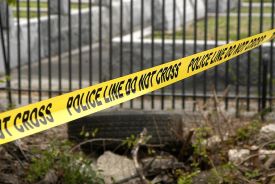Police Clear Pro-Palestinian Encampment at George Washington University Before Mayor's Hearing, Arresting 33 Demonstrators
ByIn the early hours of Wednesday morning, a long-standing pro-Palestinian encampment at George Washington University (GW) faced a dramatic end as police moved in to clear the site.
This action, occurring on the 14th day of the protest, resulted in the arrest of 33 demonstrators. The encampment, a focal point of activism demanding divestment from companies profiting from the Israel-Hamas conflict, had drawn attention and controversy since its inception.
The Sweep: Heightened Tensions and Police Intervention
The decision to clear the encampment came amidst escalating tensions and concerns raised by university and law enforcement officials. Metropolitan Police Department (MPD) officials cited various reasons for the intervention, including reports of escalating volatility and alleged incidents of assault. Additionally, the encampment had expanded beyond GW's campus, drawing in protesters from other institutions and raising concerns about safety and security.
One significant incident involved a campus police officer allegedly being shoved by a protester, highlighting the growing tensions surrounding the encampment. Reports of protesters gathering potentially offensive and defensive weapons further fueled apprehension among officials.
The MPD's decision to intervene also raised questions about the role of law enforcement in handling campus protests and the balance between maintaining public safety and respecting First Amendment rights. Critics, including some Congressional Republicans, accused District of Columbia Mayor Muriel Bowser of hesitancy in responding to GW's request for assistance, leading to the cancellation of a scheduled hearing.
READ MORE : Pro-Palestinian Protests Gain Momentum At US Universities, Prompting Divestment Consideration
Political and Campus Responses: Divisions and Debates
The clearance of the encampment sparked a flurry of reactions from various stakeholders, highlighting deep-seated divisions over the Israel-Palestine conflict and the right to protest. Congressional Republicans, led by Representative James Comer, criticized Mayor Bowser's perceived inaction and praised the swift response following the announcement of a potential Congressional hearing.
GW officials, meanwhile, faced scrutiny over their handling of the protest and their communication with law enforcement. Student protesters accused university leadership of negotiating in bad faith and failing to address their demands for divestment. President Ellen Granberg's characterization of the encampment as "illegal and potentially dangerous" further fueled tensions, with some viewing it as an attempt to delegitimize legitimate protest.
On the campus itself, the aftermath of the sweep left behind a sense of disillusionment and unresolved grievances. Despite assurances from university administrators that the encampment had been cleared without serious injuries and that operations would continue as usual, questions lingered about the treatment of demonstrators and the university's commitment to addressing their concerns.
The Broader Context: Campus Activism and Law Enforcement
The clearance of the pro-Palestinian encampment at GW reflects broader trends in campus activism and the response of law enforcement to political protests. Across the country, colleges and universities have become battlegrounds for contentious issues, including the Israel-Palestine conflict.
The differing approaches of local law enforcement agencies in handling campus protests raise questions about the role of police in safeguarding First Amendment rights while ensuring public safety. Instances where police declined to intervene, as seen in Denver and Philadelphia, underscore the complexities of balancing the rights of protesters with the responsibilities of law enforcement.
Moreover, the GW encampment saga highlights the power dynamics at play between students, university administrations, and political authorities. The clash between protesters advocating for divestment and university officials tasked with maintaining order underscores the challenges of reconciling competing interests within the campus community.
The clearance of the pro-Palestinian encampment at George Washington University serves as a microcosm of broader debates surrounding political activism, campus dissent, and the role of law enforcement. As tensions continue to simmer, the aftermath of this controversial move raises fundamental questions about the limits of protest, the responsibilities of university administrations, and the role of police in safeguarding democratic principles.
© 2026 University Herald, All rights reserved. Do not reproduce without permission.








